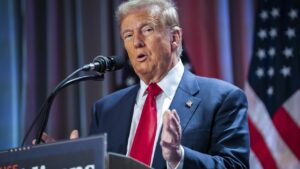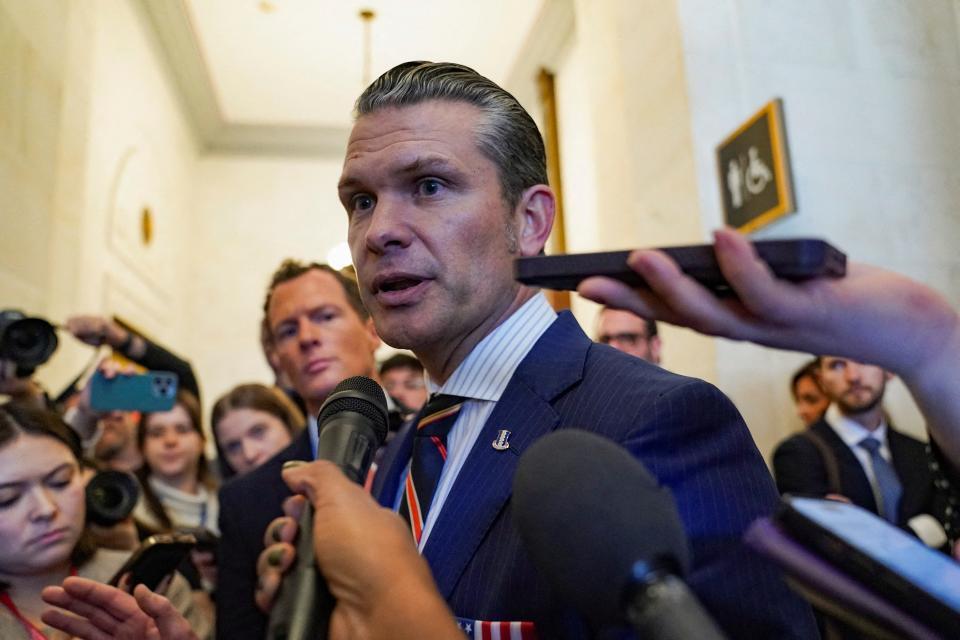As President-elect Donald Trump prepares to take office, the transition of power has been marked by scrutiny, both from inside his own party and across the political aisle. Under mounting bipartisan pressure, Trump’s transition team has signed an agreement with the Department of Justice (DOJ) to conduct comprehensive background checks and security clearances on his administration picks. This move comes after growing concerns over the lack of traditional vetting procedures, as some of Trump’s proposed nominees for key federal positions have raised questions regarding their backgrounds.
The agreement with the DOJ is an effort to satisfy demands for a more thorough and transparent selection process, ensuring that Trump’s appointments are properly vetted before assuming office. Trump’s team, which has faced increasing criticism for its handling of the nomination process, now aims to avoid any potential scandals that could undermine the legitimacy of the incoming administration. With the presidential inauguration fast approaching, this agreement serves as a clear signal that Trump is willing to comply with the typical standards expected of presidential transitions despite some early missteps.
Bipartisan Pressure and the Need for Background Checks
The push for thorough background checks on Trump’s nominees has come not only from Democrats but from within his own party as well. Republican Senator Roger Wicker of Mississippi has been vocal about the need for comprehensive investigations into the backgrounds of key appointees, saying, “The background checks are important.” The agreement with the DOJ will allow Trump’s team to submit names for both background checks and security clearances, ensuring that those who are selected for top roles undergo the necessary scrutiny before assuming office.
The decision to partner with the DOJ is a pivotal one for Trump, who has faced mounting questions about the qualifications and potential controversies surrounding his nominees. The background checks are intended to offer a full picture of the nominee’s personal and professional histories, helping to determine if they meet the standards required for serving in high-level government positions.
Controversies Surrounding Trump’s Picks

Several of Trump’s proposed nominees have attracted significant attention due to their past controversies. One of the most notable cases is that of former Congressman Matt Gaetz, whom Trump had initially considered for the position of Attorney General. Gaetz, who has been the subject of a DOJ investigation into sex trafficking allegations, withdrew from consideration after facing resistance from within the Republican Party. Even though Gaetz was never charged with any crime, the investigation raised doubts about his fitness for such a high-profile role.
Another nominee facing scrutiny is Pete Hegseth, who Trump had chosen to lead the Department of Defense. Hegseth, a former Army National Guard officer, has faced allegations of sexual assault, which he denies. Although he was never charged, the accusations have cast a shadow over his potential nomination. Additionally, Hegseth has been linked to several other allegations from his time overseeing two veterans’ groups. A whistleblower report claims that Hegseth was ousted from the non-profit organizations for personal misconduct, including mismanagement of funds and intoxication while on the job.
These controversies have prompted senators from both parties to call for a deeper look into the backgrounds of all of Trump’s nominees. As the nomination process continues to unfold, the Trump transition team is clearly working hard to address the concerns raised by both sides of the aisle.
Reassuring Voters and Senators
While some of Trump’s choices have sparked significant concern, his team is adamant that the background checks will allow them to ensure that their nominees are fully prepared for the responsibilities they will undertake in government. In a statement following the announcement of the agreement, Trump’s Chief of Staff Susie Wiles expressed confidence in the process, saying, “This agreement with the Department of Justice will ensure President Trump and his team are ready on Day 1 to begin enacting the America First Agenda that an overwhelming majority of our nation supported on Election Day.”
Wiles’ comments reflect the Trump administration’s determination to move forward with its ambitious policy agenda despite the controversies surrounding some of its key appointments. The background checks are seen as a necessary step to solidify the legitimacy of the incoming administration and demonstrate that it is committed to transparency and accountability in its operations.
Despite the reassurance from Trump’s team, not all lawmakers are satisfied with the current level of vetting. Senate Democratic Leader Chuck Schumer of New York has called for a full investigation of each nominee’s background, writing in a letter to incoming Senate GOP Leader John Thune that Senate Democrats are committed to “working in a bipartisan fashion to process each nominee by reviewing standard FBI background-investigation materials, scheduling hearings and markups in the committees of jurisdiction, and considering nominees on the Senate floor.” Schumer’s position underscores the ongoing tension surrounding the confirmation process as Democrats seek to ensure that the nominees meet the rigorous standards of public service.
The Absence of FBI Background Checks

One of the most striking elements of this transition is the absence of FBI involvement in the background check process. Reports have surfaced suggesting that Trump’s team had initially opted not to utilize the FBI to screen nominees for top positions in his administration. This decision raised concerns among both Republicans and Democrats. The DOJ agreement, however, is seen as an attempt to correct this course and adhere to the traditional norms of presidential transitions.
The FBI’s involvement in vetting nominees has long been a standard practice. The agency conducts thorough background investigations that include checks into criminal history, financial dealings, and other personal matters. By opting to bring the DOJ into the process, Trump’s team is signaling a willingness to meet the demands for comprehensive background checks, even if they come later in the transition period.
Looking Ahead: The Transition Continues
While the agreement with the DOJ represents a positive step toward ensuring a smooth transition, the road ahead remains uncertain. As more details about Trump’s nominees emerge, additional controversies will likely surface, leading to further scrutiny from lawmakers and the media. The pressure on Trump’s team to deliver a well-vetted, well-prepared administration will only increase as the inauguration approaches.
In the end, the success of the transition will depend on how effectively Trump’s team can address these concerns and navigate the complex web of political, legal, and ethical issues that come with appointing individuals to the highest offices in the land. For now, the background-check agreement with the DOJ signals that the incoming administration is taking steps to ensure that its nominees are ready to serve and that the transition process is as smooth as possible—despite its many challenges.
As the countdown to inauguration day continues, all eyes will be on Trump’s team to see how they handle the delicate process of assembling a cabinet and ensuring that their administration begins on solid footing, free from the controversies that have clouded the process thus far.

